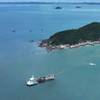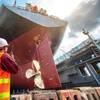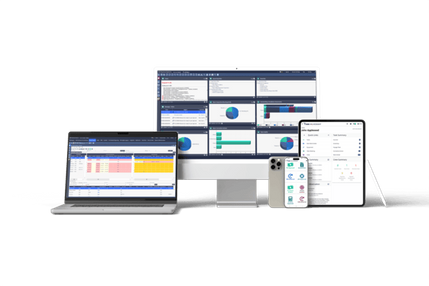The Saint Lawrence Seaway Development Corporation and its Canadian partner, the St. Lawrence Seaway Management Corporation, today unveiled a new Automatic Identification System (AIS), the first to be fielded on a North American waterway. The AIS uses the latest communication technology via universal VHF radio frequency to share vital marine navigation data from ship-to-ship, shore-to ship, and ship-to-shore in real time.
Following a ceremony at St. Lambert Lock in Montreal, Seaway engineers and personnel from the DOT Volpe National Transportation Systems Center demonstrated the AIS capabilities for the Seaway Traffic Management System and on board the vessels. Shipping industry representatives were invited aboard the Seaway Tug, Robinson Bay, to test out the system on the St. Lawrence River, where they communicated with a similarly equipped vessel and traffic controllers at the lock’s Vessel Traffic Center (VTC).
Using AIS and a laptop computer, traffic controllers can now instantly call up critical data such as vessel identification, position, speed, heading, water levels, current and cargo. Using the AIS communications protocol, vessels equipped with a transponder can be tracked to an accuracy of five meters by the three Seaway VTCs, providing all System traffic with real-time location in any kind of weather.
“The deployment of AIS has been long in the making, but it is a great stride forward in navigation safety and efficiency,” said Canadian Président Guy Véronneau. “The Seaway Corporations adopted the strategy of leveraging technology to modernize the system and regain our competitive advantage, and these cooperative efforts are beginning to pay off.”
Bolstering that view, SLSDC Administrator Albert Jacquez noted the historic nature of this event. “This ceremony marks an important day for every mariner plying the St. Lawrence River and Great Lakes,” he said. “AIS means a safer, more secure and efficient Seaway and that can only spell long-term benefits for our future.”
The AIS promises improved safety, security and efficiency throughout the Seaway. Providing instant vessel information such as type, size, location, heading and speed greatly increases the margin of safety for crews in inclement weather and enhances environmental safety. In a time of heightened security concerns, AIS offers law enforcement officials a much-needed tool for responding more quickly and effectively in any emergency. Finally, industry will see improved traffic and fleet management as ships save on fuel and manpower-related costs associated with lockage are reduced due to tighter scheduling now permissible.
Binational cooperation has been the hallmark of the Seaway AIS project, not only among the SLSMC, SLSDC, and the Volpe Center, but also the maritime industry, which contributed significantly to the cost of implementing the system. Senior marine transportation officials lauded the vision, technical excellence and commitment of dozens of marine transportation engineers, technicians and managers who helped deliver the new system.
Sponsored Content
Safer Starts Here: Build Ships, Protect Crews

Featured videos

Efficient Maritime Operations Transcend Data; Intelligence is Key

Meet the Volvo Penta IPS Electric (E)

Maritime Energy Transition: Cummins Focuses on Methanol
Subscribe for
Maritime Reporter E-News
Maritime Reporter E-News is the maritime industry's largest circulation and most authoritative ENews Service, delivered to your Email five times per week










